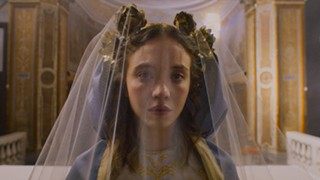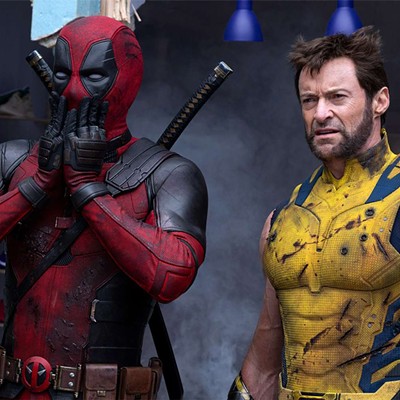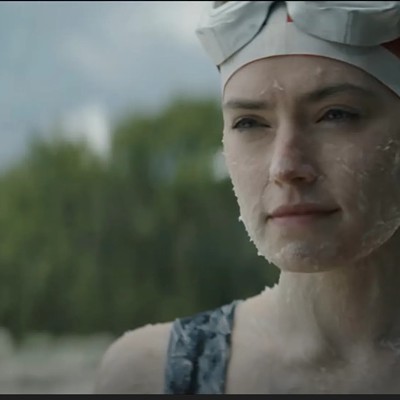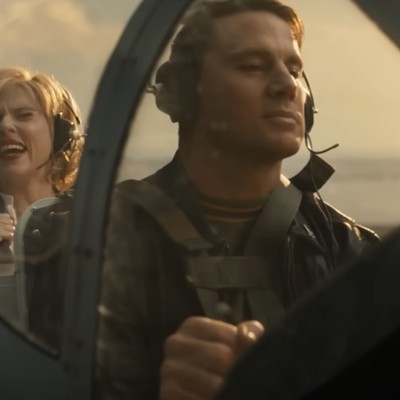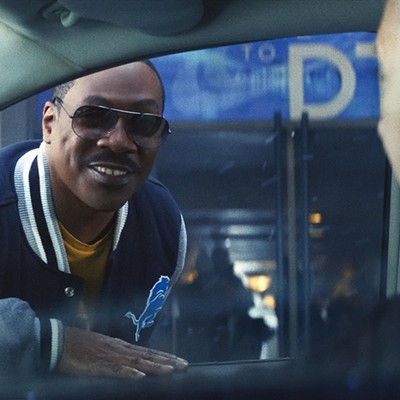Sweeney saves Immaculate
Sporting an adept inversion of a 1970s horror film trope, Michael Mohan's Immaculate is a lean, efficient shocker propelled by an innovative plot that's so clever, you'll likely forgive the liberties screenwriter Andrew Lobel takes in the third act. In many ways. Cecilia's (Sydney Sweeney) path toward becoming a nun seems preordained. Having drowned as a child but then brought back to life, since then she's felt as if her life belongs to God and her purpose is to serve Him. So, while others may look down at her decision to travel to Rome to be cloistered at the Lady of Sorrows, it makes perfect sense to her.
Built in 1632, the building seemingly lives up to its name, as a melancholy mood permeates the place. Ostensibly a retirement home for elderly nuns, many of Cecilia's duties will be tending to their needs, cleaning up after them, dealing with those afflicted with dementia and basically being on a repetitive death watch.
Being told by one of the sisters that, as she has yet to take her vows, it's not too late for her to leave, is good advice that falls on deaf ears. This isn't the only warning to come Cecilia's way. Strange dreams, random hallucinations and odd pronouncements from older nuns fail to convince her the path she's chosen is the wrong one. And then, her fate is sealed when it's discovered that, though still a virgin, she is pregnant. How this has come to pass remains a mystery but is accepted as a miracle by most in her circle, as they come to deify her, bowing in her presence. Yet, there are a select few who look at her askance, convinced there is more to this "blessed event" than meets the eye.
Though Lobel cribs from Rosemary's Baby and The Boys from Brazil, he puts his own twist on the narrative linchpins from both those movies to come up with an inventive gimmick. Once revealed, I chuckled at the audaciousness of just how the "immaculate" conception came to be, as well as its implications. The concept of the ends justifying the means is pushed to the limit here but it's not outside the realm of possibility that desperate people would buy into it.
It's a shame more background on Cecilia isn't provided, as large sections of her life are unexamined, while the movie would have benefited from a deeper examination of how the events at play impact the Catholic doctrine. Immaculate is a good genre exercise but what prevents it from being great is the screenplay's lack of depth. Still, when all the pieces fall together – which happens more times than not – the film delivers not just effective shocks but a disturbing look at how religious fervor can become so easily compromised and the justifiable can quickly turn to horror. In theaters.
Late Night breathes life into found footage horror
Once a staple of the genre, "found footage" horror films have fallen out of fashion over the last decade. Cameron and Colin Cairnes' Late Night with the Devil, utilizes this approach in a fresh way, presenting a 1970s talk show as it plays out live on television while also supplying a behind-the-scenes look at all that goes on during commercial breaks. However, before we are shown "a recently rediscovered master tape" of the episode in question, a prologue gives us the necessary background on Delroy (David Dastmalchian).
Having found success as a Chicago disc jockey, he parlayed this into a hosting gig for a national, late-night talk show. And while his program, "Night Owls" is funny enough and he has an affable personality the audience responds to, Delroy consistently remains No. 2 behind Johnny Carson for his entire career. His underdog status proves part of his appeal, especially after Madeleine (Georgina Haig), a former actress and the love of his life, dies of cancer four years into his marriage.
And while Delroy's reputation is, for the most part, blemish-free, the fact that he belongs to a mysterious men's group called The Grove seems odd. Rumors abound about this organization which meets for an annual retreat in the redwoods of California, their activities shrouded in secret. Talk of pagan rituals being conducted seem too ridiculous to be considered. Yet, something is amiss on the evening of Oct. 31, 1977, when he plays host to a Christou (Fayssal Bazzi), a rather sketchy psychic; Carmichael Haig (Ian Bliss), a debunker of all things paranormal; and parapsychologist June Ross-Mitchell (Laura Gordon), the author of the book Conversations with the Devil, concerning a case of demonic possession. She has the subject of the book, the only survivor of a mass suicide of a satanic cult, 12-year-old Lily D'Abo (Ingrid Torelli), in tow. What could possibly go wrong?
The Cairnes take their time setting up the hellraising hijinks that ensue, spending nearly an hour establishing the relationships between the guests as and Delroy. The cast is in unison whereas creating the same vibe is concerned, each taking the material seriously, their characters displaying a sincere sense of skepticism that gives way to horror as events unfold. If the film has a fault, it's that it overstays its welcome as it contains a sequence or two too many that nearly pushes the tension into tedium. Still, all is forgiven once the carnage begins to play out on the "Night Owls" set and Delroy pays for whatever Mephistophelian deal he may have made for his success. To be sure, he finally gets the recognition he's craved, but the price proves too high even for a No. 1 rating in his time slot. In theaters.
Predictable Road House still proves fun
Early on in Doug Liman's Road House, a character says of ex-UFC fighter Dalton's (Jake Gyllenhaal) mission to chase off a gang of miscreants from the titular establishment, "That sounds like a western to me." Truer words were never spoken as this update of the Patrick Swayze cult favorite plays like a take-off of George Stevens' classic oater, Shane. And while the film doesn't feature a small pre-teen boy yelling the hero's name as he rides off to parts unknown, there are too many similarities to ignore.
Dalton has no six shooters on his hips – he doesn't need them as his hands are lethal weapons, something he learned when he killed a fellow MMA fighter during a match. Running from his past while toting around a death wish, he accepts the above-mentioned job from Frankie (Jessica Williams), the bar's owner. Seems poor little rich boy Ben Brandt (Billy Magnussen) has been sending his henchmen to beat up the patrons and cause general mayhem at the watering hole again and again. The hope is this will scare off customers and force Frankie to sell the establishment to her nemesis, who plans to build a resort on the property.
Gyllenhaal's soft-spoken, sardonic approach to Dalton holds the film together, the actor lacing a subtle sense of irony in his line readings that lets us know he's in on the joke. Convincing whether cracking skulls or wisecracks, the fun he's having proves infectious. In his film debut, Conor McGregor as Dalton's counterpart Knox brings the same degree of intensity he repeatedly brought to the steel cage during his days as a UFC champion. His antagonistic charisma plays well on the screen, and he could have a long career playing tough guy roles, if he chooses.
Liman's use of small digital cameras, sometimes attached to the actors, puts the viewer in the middle of the mayhem, which occurs with watch-setting frequency. This, coupled with the director's constantly roving handheld camera, provide these sequences with a sense of visceral immediacy, it's immersive nature a bit bracing at times. However, it captures the brutality of and raises the stakes in this world of machismo and violence.
A shift in tone during the third act is off-putting, as Dalton, pushed too far, allows his dark side to emerge. A callous disregard and at times satisfaction over the damage he inflicts replaces the good-natured fisticuffs that precede them. This is a disturbing misstep that leaves a sour taste that is only barely cleansed with a too-neat finale. Still and all, this is far from art house cinema. Liman knows his audience and his Road House delivers the sort of slick action cinema that genre fans and good ol' boys crave. Streaming on Amazon Prime.

